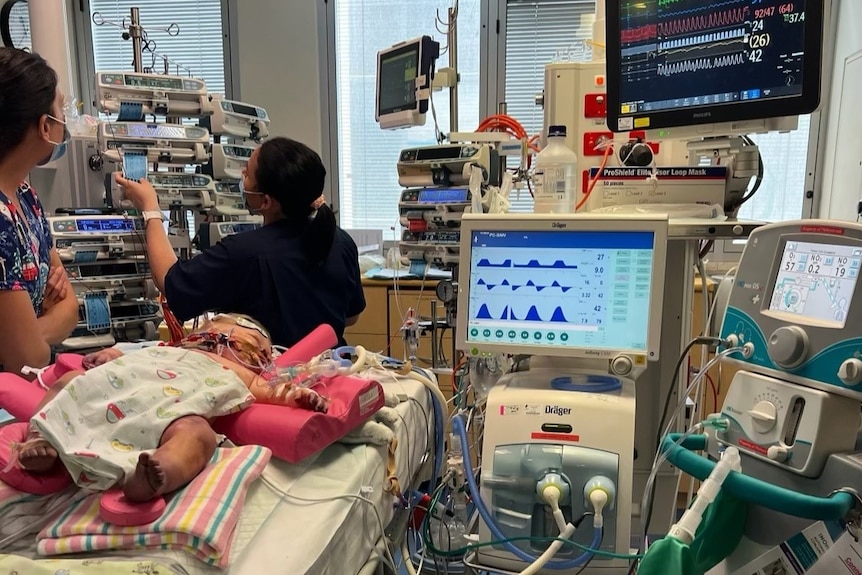Infection
Ryan’s fight for life cost him his feet and several fingers, but he’s still his ‘cheeky’ little self
Ten months after winning his Herculean fight for life, Ryan Lines is a fairly typical “cheeky” toddler.
The nearly two-year-old gets frustrated sometimes, his mum says, but overall Ryan is adapting well since a traumatic infection led him to have his feet and some of his fingers amputated.
Nearly a year ago, the then 13-month-old went into septic shock due to a group A Streptococcus bacterial infection, or Strep A, a severe infection that affects the blood.
On December 8 last year, Ryan was flown from his home in the outback mining town of Broken Hill to Adelaide Women’s and Children’s Hospital.
Over the next four months, he underwent multiple amputations after extensive blood clotting caused tissue in his hands and lower legs to die from a lack of nutrients.
It was a huge upheaval for the Lines family and a big adjustment for Ryan, but mum Jess Lines says the future is bright.
His most recent surgery was some weeks ago to try to help with some scarring on his hand.
“He’s going pretty good. He has his moments where he’s a little bit frustrated but he’s [still] a cheeky nearly two-year-old,” Mrs Lines said.
“We’re trying to get him used to [his prosthetics]. He’s not walking with them yet, but he is trying to take movements with them, so it’ll just be a time thing to see when he can actually do that and when he gets his strength back.”
Parents urged to trust gut instincts
The Lines family wants to help raise awareness about Ryan’s life-altering infection and is urging parents of other young children to trust their gut instinct if they think something is wrong.
Ryan’s own symptoms before he was hospitalised had appeared quite innocuous, including muscular pain and a low urine output.
“It’s crazy to me to think that he just had a simple runny nose and sore throat and it advanced into something so serious,” Mrs Lines said.
A life-altering condition
Each year an estimated 55,000 Australians are affected by sepsis, which is when the body’s response to an infection inadvertently attacks its own tissue and organs.
Untreated, these symptoms may progress to septic shock where the organs shut down.
Young Ryan went into cardiac arrest for 10 minutes.
“Unfortunately, in a lot of cases, it can lead to death so if it’s not recognised early and treated promptly it can be a major problem,” said intensive care nurse and sepsis researcher Associate Professor Naomi Hammond.
“Around half of those who do survive are left with lifelong disabilities and these can range from health impacts or cognitive deficits, but, as in Ryan’s case, there can be severe physical disabilities.”
Dr Hammond, who also works with Sepsis Australia, wants to raise more awareness about the condition.
She says sepsis can affect anyone and stem from any infection, although certain demographics are more vulnerable, including children.
“Unfortunately, the signs can be similar to any other infection [so] what you need to look at [is when] their symptoms are getting much worse,” Dr Hammond said.
“I think with a lot of cases [with] children, it’s even harder for parents to be able to pick up.”
‘A forever journey’
Ryan is scheduled to return to hospital in about six months’ time to have X-rays done on his legs to see when the bone will need to be shaved back.
However, having received constant emotional support throughout the ordeal, as well as more than $130,000 in monetary donations, Mrs Lines says they are looking ahead with a smile.
“Obviously with Ryan we don’t actually know what the future holds … there will come a point where he will probably need a wheelchair and that will mean we need to modify our house or our car,” she says.
“So, I think it’s just amazing that we’ve had that support to be able to have the hope that we will be able to help Ryan however we can in the future.
“I dare say it’s going to be a forever journey and we want everyone to come along with us and we thank everyone so much. We honestly wouldn’t be able to do it without everyone.”
Get our local newsletter, delivered free each Friday

